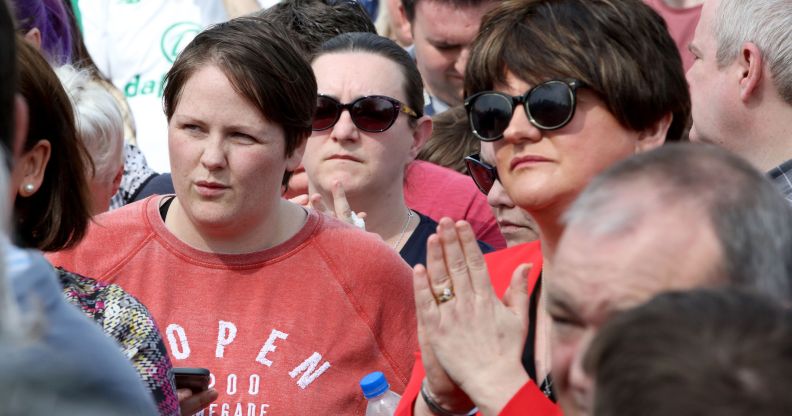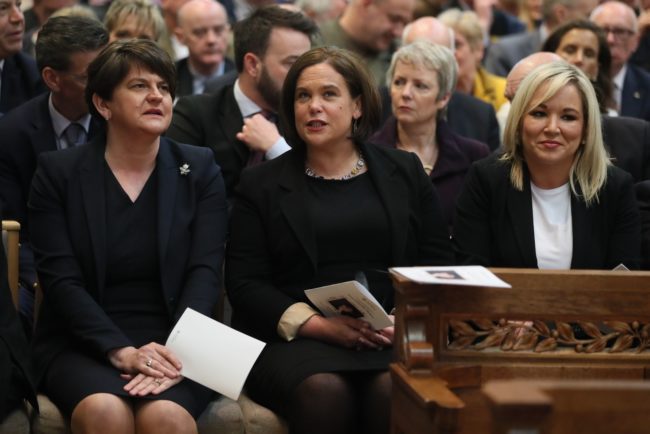Arlene Foster still opposes equal marriage despite ‘sympathy’ for Lyra McKee partner

Sara Canning (L), partner of killed journalist Lyra McKee, stands beside Democratic Unionist Party (DUP) leader Arlene Foster (R) at a gathering to condemn McKee’s killing near the scene of rioting violence in the Creggan area of Derry in Northern Ireland on April 19, 2019. (PAUL FAITH/AFP/Getty)
Democratic Unionist Party (DUP) leader Arlene Foster has said that she remains opposed to equal marriage, despite having “sympathy” for the partner of murdered journalist Lyra McKee.
On Wednesday (April 24), Foster joined political leaders from across the UK and Ireland at the funeral of Lyra McKee, a journalist who was shot dead in Derry, in an attack later claimed by dissident republican group New IRA.
McKee, a campaigner for LGBT+ rights, is survived by her partner Sara Canning.
It was not legal for the pair to marry in Northern Ireland, as the DUP has long opposed equal marriage and blocked progress on the issue.
DUP leader Arlene Foster says opposing equal marriage ‘remains the position of the party’
Speaking to RTÉ’s Morning Ireland on Thursday (April 25), Foster insisted the party has not changed its stance despite a flood of public support for Canning.
She said: “We have a long standing policy, which hasn’t changed, of support for traditional marriage. That remains the position of the party.
“That does not mean I cannot sympathise and empathise with Sara and say to her that we feel her love.
“As I said, her loss was all of our loss because this was a young woman who was doing great things in journalism and living her life in a city that she adopted and she loved.
“I don’t think that takes away… you shouldn’t conflate the two issues of empathy and sympathy with Sara for her loss, and a political issue of the definition of marriage.”

Democratic Unionist Party (DUP) leader Arlene Foster (L) is opposed to same-sex marriage. (BRIAN LAWLESS/AFP/Getty)
Between 2012 and 2016, the DUP repeatedly used a peace process power known as a ‘petition of concern’ to block equal marriage bills in the Northern Ireland Assembly, despite majority support from MLAs and the general public.
The Northern Ireland Assembly has not sat since January 2017 following the breakdown of power-sharing between the DUP and Irish republican party Sinn Féin, meaning no further attempts to secure equal marriage can be made.
LGBT+ campaigners have called on the UK government to implement equality directly via Westminster in the absence of power-sharing, but Prime Minister Theresa May has declined to do so.
DUP is softening anti-LGBT stances
In recent years the DUP has signalled a softening of its hardline anti-LGBT beliefs, despite continuing its resolute opposition to equal marriage.
Earlier in April, the party selected an openly gay candidate to run in a council elections.
Alison Bennington is running for the DUP in the Glengormley Urban area of Antrim and Newtownabbey Borough Council.
If Bennington is elected, she will be the DUP’s first ever openly gay elected representative.
Bennington said she is “delighted” to have been selected to run for council elections as a DUP candidate.
“I am putting myself before the electorate based on what I can deliver for them as a councillor working alongside a strong team of colleagues, not based on my sexual orientation,” she said.
“I regard my private and family life as a matter for myself in the same way as everyone else.”

